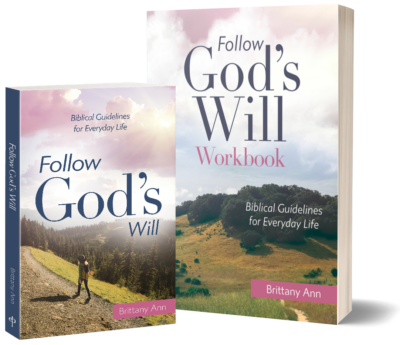15 Insightful Bible Study Questions (Individuals or Groups!)
 One of the reasons the Bible is so fascinating is that it isn’t a book you just read.
One of the reasons the Bible is so fascinating is that it isn’t a book you just read.
While I do recommend that you actually learn how to read the Bible, that should only be the beginning of your understanding.
God’s Word is also meant to be savored, wrestled with, meditated on, memorized, recited aloud, and more!
Rich, meaningful Bible study begins with thoughtful, deep Bible study questions.
Whether you’re a small group leader looking for some interesting Bible topics to discuss, or you’re seeking devotional questions for your personal quiet times, some general Bible study questions are essential for exploring and understanding any part of the Scriptures.
Here are 15 thought-provoking Bible study questions to help you take your devotions even deeper.
*This post contains affiliate links, which means if you make a purchase, I may make a small commission at no additional cost to you. This helps cover the many costs of running this site and allows me to help provide for my growing family. Thank you!
Ready to Take Your Bible Study Even Deeper?
Don’t settle for simply reading God’s Word. Learn how to study it, understand it, and apply it practically to the real life issues you face every single day.
Be sure to check out my latest book, Follow God’s Will: Biblical Guidelines for Everyday Life, for a super practical, step-by-step guide to help you dive into God’s Word so Scripture comes to life like never before.
Practical, encouraging, and full of biblical truth, Follow God’s Will is designed to help you answer questions including:
- What does God want me to do?
- How do I apply the Bible’s instructions to my life today?
- Where is God calling me personally?
- How can I make a difference right where I am?
- How should I navigate relationships with those who think, act, or believe differently than I do?
- And so many more!
Want to start reading for free?
Simply enter your first name and email below, and I’ll send you an exclusive “first-peek” right away, right to your inbox!
15 Thought-Provoking Bible Study Questions to Take Your Devotions Deeper
This series of questions is designed to help you think deeply about the text. You do not have to go through all of them or in any particular order. As open-ended questions, they will not necessarily point to concrete answers—in fact, they may lead to even more questions!
Don’t let this discourage you or your group members if you’re discussing the text together. Prayerfully seek guidance from the Holy Spirit, and be curious as you explore.
Related Reading: How to Have Daily Bible Devotions When Life Is Chaotic
1. Who Is the Writer?
This is one of the first Bible study questions you should ask when studying any book of the Bible. Who wrote this?
While it seems straightforward enough, especially with books where the author’s name is used for the title (like Matthew, Mark, Luke, and John), you’ll soon find that there’s a lot more to learn.
For instance, not every book’s author is known. Other books’ origins may be debated.
Some related questions may include: whether we know the author’s name or not, what do we know about them? What do they say about themselves in the text? What message might they be trying to communicate and why?
A good study Bible or an online resource like the NET Bible can point you in the right direction.
Note that these Bible study questions about authorship do not indicate that the Scriptures aren’t inspired. They encourage you to learn more about how God used different people to communicate His Word.
2. Who Is the Original Audience?
Once you’ve explored who the author is or might be, the next logical Bible study questions are about the audience. To whom is the author speaking, in the original work?
This is important to ask because, while the Word of God is timeless across generations and cultures, that doesn’t mean that every single line of text is directly applicable to every person in history. For example, the purity laws in Leviticus, while relevant in God’s story, aren’t meant for us to follow in the 21st century.
I’ve also heard it said that to understand the letters in the New Testament, you have to approach them like reading someone else’s mail. They might have information that is useful for you, but they aren’t necessarily written to you.
Related Bible study questions include: What was God communicating exclusively to the original audience, and what is He communicating to everyone?
It takes wisdom to discern the Scriptures this way, which is why this is such a fascinating Bible topic to explore or discuss.
Related Reading: How to Read the Bible Daily (with Bible Reading Plans!)
3. What Is the Historical Context?
Knowing who, what, when, where, and why events happened in history are important Bible study questions because they provide the backdrop of the Biblical story.
Without this context, it’s easy to get lost when studying the Bible. There are a lot of names of people, places, and empires that many of us in the modern world aren’t familiar with.
While you can gather some of the historical context from the Bible itself, it is also very helpful to have maps of the ancient Near East, timelines, and general knowledge about the rise and fall of different kingdoms and empires.
Note that some of these facts are hotly debated by historians, Biblical scholars, and archaeologists. That’s all the more reason to do your homework well.
4. What Is the Cultural Context?
Bible study questions about cultural context are also important to ask because the people who wrote the Bible had different languages, lifestyles, and social norms than we do. That means that they may have understood some of the Biblical instructions differently.
For example, the people in Jesus’ time lived in what is called an honor-shame culture. People valued the honor of their family above life itself. So when a tax collector like Matthew was shunned by the people in his community, he was essentially dead to them.
While they aren’t necessary for understanding the basic message of the Scriptures, Bible study questions about ancient cultures can add much depth.
Related Reading: How to Study the Bible for Beginners
5. What Is the Literary Genre?
You didn’t have to get an A in your high school English class to know that there are many genres in writing: poetry, historical fiction, nonfiction, biography, and so on.
It’s the same with the Bible. Bible study questions about the genre are important because different types of literature communicate different things. For example, you’ll want to be cautious about taking instruction from genres like apocalyptic literature or poetry.
The main genres found in the Bible include:
- Narrative: tells a story
- Poetry: uses figurative language to express emotion
- Wisdom: speaks to moral and ethical issues
- Prophecy: God’s words of warning and encouragement
- Gospel: proclaims the good news of the kingdom
- Epistle: letter for specific purposes
- Apocalyptic: type of prophecy that uses symbolic language
There are sub-genres within these, and some books of the Bible include multiple genres. But a basic overview of the genres should provide plenty of interesting Bible topics to explore and discuss.
6. What Patterns or Themes Do You See?
The more you study the Bible, the more familiar you get with certain ideas that are repeated. Concepts like the temple, tree of life, Son of Man, exile, Messiah, and covenants are just a few Biblical themes you can study.
One way to generate your own Bible study questions about themes is to just pay attention to what sticks out as you read.
In many Old Testament verses, for example, you’ll see words and concepts repeated over and over, to the point where it sounds strange. If something seems unnecessarily repetitive, use that as an invitation to dig deeper into the concept.
7. What Words Stand Out?
As you get more familiar with the Bible, you may find that certain words stand out or spark curiosity. It doesn’t necessarily have to be a repeated word or theme, but just something you find interesting.
For example, you might run across the word “lavished” in Ephesians 1:7-8 (NIV): “In him we have redemption through his blood, the forgiveness of sins, in accordance with the riches of God’s grace that he lavished on us.” You might wonder, What is the meaning of this word in the original language?
A quick search in one of my favorite Bible study tools, Blue Letter Bible, leads me to the Greek word perisseuō, which is a verb that describes overflowing. It’s also used to describe when there were leftovers after Jesus fed the crowds.
I now have even more Bible study questions to explore based on this one word and a richer understanding of God’s grace—because of one word!
Related Reading: 10 Best Bible Studies for Women to Help You Grow in Faith
8. What Literary Tools Is the Author Using and Why?
There are many, many fun “treasures” that the Biblical authors use throughout the Scriptures to emphasize different points and make you think. See if you can find them! A short list includes:
- Numbers: When certain numbers are used, they can communicate ideas, not just numerical value. For example, 2 can represent union, 5 can refer to the law (the 5 books of Moses), 7 can represent completeness (days of creation), and 12 can represent God’s people (tribes of Israel).
- Chiasm: A pattern in the text that emphasizes a particular concept.
- Symbolic imagery: Hebrew is a language that frequently uses images to communicate, like describing God as a fortress or an eagle.
- Wordplay: Clever use of words in the Bible is everywhere—which is why it’s so useful to learn about the original languages! For example, Jesus changed Simon’s name to Peter, meaning rock, which is full of symbolic significance.
- Parallelism: The author puts two stories or ideas side by side, inviting the reader to compare and assess the two. Some examples include the story of Abraham followed by the story of Isaac, or many of the Proverbs.
Check out more Biblical literary tools to deepen your Bible study questions.
9. What Is the Key Message of This Chapter or Book?
When you’ve researched things like cultural and historical context as well as learned more about the author, audience, and literary techniques, you have a clearer picture of what different passages are trying to communicate. When you ask Bible study questions about the key message of a chapter or book, you should be able to summarize that section briefly.
This can be fun to discuss in a small group Bible study because different people might be seeing different ideas. See what you can learn from others’ insights!
10. How Does This Fit into the Larger Biblical Story?
When using these Bible study questions to dig deep into certain passages or books, be sure to take a step back and look at the big picture. Every part of the Bible is part of a larger narrative about God and His redemptive plan for the world through Jesus Christ.
So when you get bogged down in passages like instructions for building the tabernacle, you might ask deep Bible study questions like What is the tabernacle for? How is God using it as part of His plan?
Related Reading: How to Seek the Kingdom of God First (Matthew 6:33)
11. What Does This Passage Say About God?
Since the Bible is a unified story, God’s character is consistent throughout. For example, a famous passage in Exodus 24:6–7 says, “The Lord, the Lord, the compassionate and gracious God, slow to anger, abounding in love and faithfulness, maintaining love to thousands, and forgiving wickedness, rebellion and sin. Yet he does not leave the guilty unpunished; he punishes the children and their children for the sin of the parents to the third and fourth generation.”
There is a lot to process in that passage and indeed with the whole Bible as we get to know a God who is full of both grace and righteousness. How do you see that playing out?
12. What Does This Passage Say About Humans?
The Bible is not just a story about God but about His relationship with humans, His image bearers. Just as it’s helpful to take a step back and reflect on what you can learn about God, Bible study questions about the nature of humanity are also helpful.
As an example, the book of Judges is one of the most disturbing sections in all of Scripture because of the horrible way God’s chosen people behave. When you ask Bible study questions about humans, it helps you see that they behave in rebellious tragic ways (and that God is extremely patient with them!).
13. What Do You Find Inspiring?
While it’s fun to get nerdy in your study, Bible study questions that address your heart are just as relevant. You don’t have to use fancy tools or methods to just simply reflect on what moves and inspires you.
This question may prompt you to sit with and meditate on a passage for a while. Say it aloud, memorize it, or put it somewhere visual. You may continue to find new ways it inspires you and encourages your soul.
Related Reading: How to Read the Bible When You Feel Stuck
14. What Do You Find Challenging or Confusing?
I’ve been studying the Bible for many years, and I’ll admit that there are still parts of it that just don’t make a lot of sense to me! While that can be an uncomfortable reality, it’s important not to shy away from Bible study questions about our doubts and concerns.
When I’ve dug deeper into those hard questions, I’ve often come through them with a more faithful understanding of who God is and how He operates. Plus, faith would be super boring if we had all of our tough Bible study questions answered simply.
15. What Can You Apply to Your Life Practically?
This is one of the most important Bible study questions you can ask—essentially, so what? Now that you’ve learned something, what are you going to do about it? The Word of God leads to spiritual growth and transformation for Christians of every age and stage. Don’t miss out on its power!
If you need help organizing your thoughts about these Bible study questions, be sure to check out the Create the Space Quiet Time Planner & Journal!
Which of these Bible study questions are you most excited to use? What would you add?








One Comment